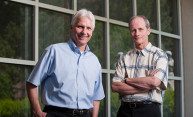 September 9, 2013
September 9, 2013
Jane McGonigal’s talk, “The Game that Can Give You 10 Extra Years of Life,” is a shining example of what bright, creative, innovative people can do when faced with an overwhelming challenge in their lives. How this game came about is quite intriguing in of itself. A few years ago in the middle of her fast-rising career, McGonigal suffered a severe concussion and ended up both a physical and a mental wreck. She couldn’t do anything except lie in bed, AND she began to feel suicidal. Then one Bay Area foggy, dreary day, she up and decided to use her passion for video games to do something that would help other people and herself deal with terribly debilitating conditions and/or diseases.
The end product was SUPERBETTER: a video game that helps people recover from an illness or injury by increasing their personal resilience. McGonigal defines resilience as “… staying curious, optimistic and motivated in the face of the toughest challenges.” And as such, being resilient is a powerful force in becoming and staying healthy and happy.
In her TEDTalk video, the now-famous game maker notes that her SUPERBETTER work was heavily influenced by Bonnie Ware, an Australian palliative care nurse, who recorded what dying patients in hospice situations said they regretted most in their lives. Astonishingly, what Ware heard from the dying about what they wish they had done during their lives is exactly the stuff I counsel teens to do in making course, activity, college, major and career choices at the beginning of their lives!
Among other things, dying people say that they wish:
They’d had the courage to live their lives being true to themselves rather than according to what others expected of them
I tell students to “dare to be themselves” as they make important decisions such as where to go to college and what to do for a career. “Daring to be yourself” is even a part of the subtitle of my college admissions book.
They had been more honest and expressed their feelings
I encourage teens to figure out who they are, what they need and want (and don’t want) and to appropriately express themselves as a part of becoming honest, trustworthy, authentic people. In fact, some of my students learn to be their most authentic selves through the self-discovery process of writing admissions essays.
They had allowed themselves to be happier
I spend a lot of time teaching teens how to create positive choices, make good decisions, choose to be in healthy, enriching environments and spend time with (and be) fulfilled, happy people.
McGonigal asks, “What Would You Do with Ten Extra Years of Life?” I’m asking teens, “Who Are You, What Do You Love, and How Does What You Do With Your Life Reflect That?” Wouldn’t it be interesting to know if people who are dying might have many fewer regrets if they had started their lives answering those questions?
In a similar vein to McGonigal’s research, my work stems from a train of thought that suggests seeking authenticity and engaging in fulfilling endeavors benefit not only the individual, but also the community of which they are a part.
People who know themselves and are authentic feel alive and experience continuous sources of energy. They also tend to be happier and more naturally kind and loving. This is no surprise because when someone is personally “filled,” they give to others from overflow, not from their own deficit or duty.
University of Rochester Professor of Psychology, Dr. Edward Deci, says that people who tap into their own natural talents, interests and desires are more inclined to embrace whatever they do with enthusiasm, creativity and joy. He also points out that people who make things happen for themselves are less likely to be manipulated or used.
Even the World Health Organization declares that “Health involves more than just the absence of disease or infirmity.” The most enlightened health professionals of the day say that health is an ongoing process of self-discovery in which you:
— Know yourself
— Exercise positive choices
— Integrate your physical, mental, social and spiritual well-being
— And live life to its fullest so that you can have a positive influence on the world.
This is all to say that McGonigal really seems to know what you need to do to gain ten extra years of life, or to simply get the best out of your next 10 years, or next 50 for that matter! Not only is one educated by her talk, but she is a ball to watch. Her message is one worth sharing with your parents, your friends, and your teens!
http://www.huffingtonpost.com/marjorie-hansen-shaevitz/what-would-you-do-with-te_b_3875677.html
 Research has also shown similar benefits to simply being around nature. One study showed that spending time in natural settings makes us more generous and more community-oriented, a conclusion that has “implications not only for city planning but also for indoor design and architecture,” according to the study’s co-author Richard Ryan, of the University of Rochester Medical Center. Another study by Dutch researchers showed that those who live within 1 kilometer of a park or wooded area suffer lower rates of depression and anxiety. Even if we don’t live amid trees and greenery, we can always take a walk through them. And when scaled up, this could have real societal consequences. “As health-care costs spiral out of control, it behooves us to think about our green space in terms of preventive health care,” said Dr. Kathryn Kotrla, of the Texas A&M College of Medicine.
Research has also shown similar benefits to simply being around nature. One study showed that spending time in natural settings makes us more generous and more community-oriented, a conclusion that has “implications not only for city planning but also for indoor design and architecture,” according to the study’s co-author Richard Ryan, of the University of Rochester Medical Center. Another study by Dutch researchers showed that those who live within 1 kilometer of a park or wooded area suffer lower rates of depression and anxiety. Even if we don’t live amid trees and greenery, we can always take a walk through them. And when scaled up, this could have real societal consequences. “As health-care costs spiral out of control, it behooves us to think about our green space in terms of preventive health care,” said Dr. Kathryn Kotrla, of the Texas A&M College of Medicine.
 esearch has also shown similar benefits to simply being around nature. One study showed that spending time in natural settings makes us more generous and more community-oriented, a conclusion that has “implications not only for city planning but also for indoor design and architecture,”
esearch has also shown similar benefits to simply being around nature. One study showed that spending time in natural settings makes us more generous and more community-oriented, a conclusion that has “implications not only for city planning but also for indoor design and architecture,” 


 Developed by University of Rochester experimental psychologists Edward Deci and Richard Ryan in 1985, self-determination theory today is a leading theory of human motivation, vetted by scientists worldwide. The psychological framework, in the words of author Joe Robinson, provides “a veritable GPS to fulfillment, decoding our innermost longings and linking the world of science and spirit.”
Developed by University of Rochester experimental psychologists Edward Deci and Richard Ryan in 1985, self-determination theory today is a leading theory of human motivation, vetted by scientists worldwide. The psychological framework, in the words of author Joe Robinson, provides “a veritable GPS to fulfillment, decoding our innermost longings and linking the world of science and spirit.”
 If you think giving someone the cold shoulder inflicts pain only on them, beware. A new study shows that individuals who deliberately shun another person are equally distressed by the experience.
If you think giving someone the cold shoulder inflicts pain only on them, beware. A new study shows that individuals who deliberately shun another person are equally distressed by the experience.